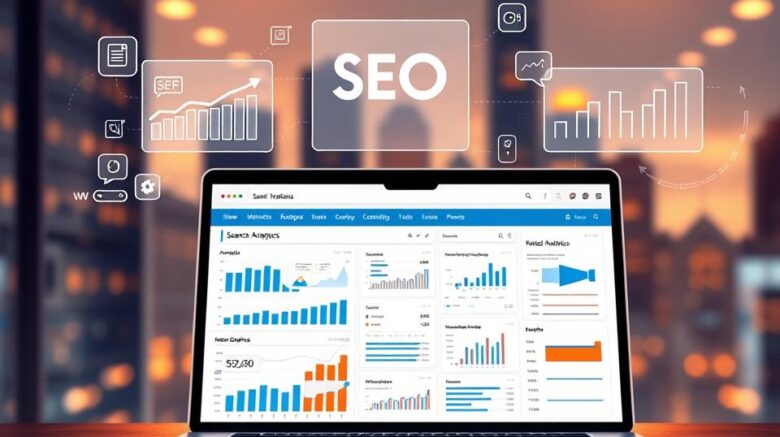Enhance Your SEO Capability through Our Professional Advice
Did you know that 93% of online experiences start with a search engine? This statistic underscores how vital search engine optimization (SEO) is for companies. A thoughtfully designed SEO approach can markedly improve your website’s position. Thus, employing top SEO practices that increase organic traffic is essential. At Marketing1on1.com, our mission is to lead you through the nuances of SEO.
We aim to help you optimize your content for both users and search engines. This guarantees enhanced Digital Marketing 1on1 exposure and interaction. With our step-by-step support, you’ll harness your web presence completely.

Understanding the Basics of SEO
Search engine optimization (SEO) is essential for boosting a site’s visibility. Through proficiency in SEO fundamentals, companies can elevate their search positions. Crafting content aligned with user intent assists search engines in efficiently crawling and indexing your site.
Comprehending search engines’ operations is vital to mastering SEO. They employ sophisticated algorithms to evaluate a website’s content, architecture, and relevance. A logically arranged website both delights users and streamlines search crawler indexing.
Vital SEO techniques cover reducing load times, ensuring responsiveness on mobile, and enhancing accessibility. Neglecting these aspects can harm a site’s ranking, impacting its credibility and traffic.
Investing in SEO fundamentals builds a sturdy foundation for more complex tactics. With digital trends changing rapidly, ongoing learning of best methods is crucial. This guarantees your site stays efficient and prominent in search listings.
Designing a Winning SEO Strategy
Crafting an effective SEO plan requires a number of critical phases. First, conducting a detailed website audit is essential. Solutions like Google Analytics and SEMrush pinpoint areas of strength and weakness. This step is vital for pinpointing areas needing improvement.
Understanding your competitors’ performance is also critical. Spotting opportunities in the market lets you draw better-qualified visitors. This process emphasizes setting clear targets so your work matches your aims.
Developing a keyword strategy is another important aspect. Choose less competitive terms that match what users seek. Regularly monitoring and adjusting your strategy is necessary to stay ahead in the dynamic digital world.
The Role of Keyword Research in SEO
Keyword research is the foundation of a successful SEO strategy. It’s about identifying the phrases your target market searches for. Platforms such as Google Keyword Planner and Ahrefs enable marketers to collect fitting keywords aligned with intent. This understanding allows you to create content that directly addresses what your audience is searching for.
Aiming for user-centric keywords often leads to far greater visibility. Pages optimized around these terms tend to rank higher, drawing in more natural visits. Regularly updating your keyword research keeps your content relevant, meeting your audience’s changing needs.
| Keyword Research Tools | Key Features | User Intent Alignment |
|---|---|---|
| Google Keyword Planner | Competition level | Focuses on search volume |
| Ahrefs | In-depth analysis | Helps in identifying actionable keywords |
| SEMrush | Backlink analysis | Analyzes competitors to refine targeting strategy |
By honing keyword research skills, marketers can customize content for user needs, enhancing engagement and conversions. This perpetual process is vital for preserving and enhancing SEO success.
On-Page Optimization Techniques
Optimizing on-page elements is critical for search visibility and rank. It starts with optimizing titles, headings, and body content for targeted keywords. This makes it clear to search engines what each page offers. It ensures the information is both authoritative and relevant.
Metadata, like meta descriptions, greatly impacts click-through rates. Crafting engaging and descriptive meta tags encourages users to explore your content. Updating meta details regularly signals ongoing relevance to search bots.
Proper layout enhances readability, guiding users smoothly through your pages. Internal linking connects pages and enhances user experience by guiding visitors to more resources. These strategies boost your site’s overall SEO health.
Off-Page Optimization for Improved Ranking
External SEO efforts play a crucial role in enhancing your site’s authority and reach. It mainly involves acquiring backlinks from trusted sources, which boosts your authority. Trusted backlinks indicate to search bots that your content merits high ranking. This can lead to a significant jump in your website’s ranking.
Using social media to engage with your audience can also improve your off-page SEO. By posting Marketing 1on1 SEO insightful content, you build and maintain customer interest. Such engagement often inspires users to reference your site with backlinks. Joining niche forums and groups often results in additional organic links.
Organizing PR outreach can yield valuable external SEO benefits. They often result in citations on authoritative sites that boost your reputation. Over time, these efforts build a stronger online presence.
| Strategy | Benefits |
|---|---|
| Backlinks from authority sites | Improves search rankings and builds credibility |
| Social media promotion | Increases visibility and drives traffic |
| Public relations campaigns | Enhances brand reputation and recognition |
| Community engagement | Fosters relationships and organic backlinks |
Generating high-value content is paramount. Emphasizing these off-site efforts yields long-term credibility benefits. User-driven shares and citations can dramatically influence your outcomes.
Maximizing Organic Traffic through Quality Content
Excellent content forms the bedrock of successful SEO. Developing content aligned with reader interests increases interaction and organic reach. Focus on making articles and blog posts that offer value, are authentic, and meet your target market’s needs.
Engaging content keeps visitors on your site longer, reducing bounce rates. Use a variety of formats like how-to guides, listicles, and case studies to keep your audience interested. Frequent publication and refreshing of posts enhance your site’s authority and currency.
Integrating targeted keywords into your writing improves your visibility in search results. Write organically so that keywords fit the content’s tone and subject. Use analytics to understand what content your readers find most engaging.
| Content Type | User Engagement Level | Organic Traffic Potential |
|---|---|---|
| Blog Posts | High | Moderate to High |
| Infographics | Very High | High |
| Videos | Very High | High |
| Case Studies | Moderate | Moderate |
The connection between quality content and user engagement drives organic traffic to your site. By focusing on these elements in your content strategy, you can build a loyal audience and enhance your site’s search engine performance.
The Role of Technical SEO
Technical SEO aims to improve site architecture for users and crawlers. This covers page speed optimization, mobile readiness, and logical URL formatting. Such measures streamline crawling and indexing by search bots.
Using schema markup can also help search engines understand your site’s content better. This can lead to more visibility in search results. Periodic checks using Google Lighthouse can uncover performance bottlenecks. Addressing these issues enhances both UX and SEO performance.
Monitoring and Analyzing SEO Performance
Tracking SEO outcomes lets you assess how well your tactics are working. Platforms like Google Analytics collect crucial insights on visitor behavior. Combining GA and GSC gives you a clear view of traffic origins, bounce percentages, and interaction metrics.
Periodic SEO health checks are indispensable. They identify optimization opportunities and confirm compliance with evolving standards. Defining clear KPIs tied to your objectives lets you measure your SEO with precision.
| Metric | Importance | Tool |
|---|---|---|
| Traffic Sources | Understand where your visitors come from | Google Analytics |
| Bounce Rate | Evaluate content effectiveness and site engagement | Google Analytics |
| Conversion Rate | Measure success of traffic in relation to goals | Google Analytics |
| Site Health | Identify technical issues affecting SEO | SEO Audits |
Regularly reviewing these metrics enables businesses to make informed decisions. By leveraging robust tracking and analytics platforms, companies can elevate their digital footprint and search performance.
Influencing How Your Site Appears in Search Results
How your pages appear in SERPs directly affects click-through rates. Well-written meta summaries serve as click magnets. A compelling title and an engaging meta description summarize your content, enticing users to choose your page over others. Additionally, refining your structured data boosts your snippet presentation.
Enhanced results via rich snippets pack extra punch. With schema markup, you provide search engines with enriched result context. This can lead to higher visibility and better click-through rates. Strategic snippet optimization drives higher user interaction and SEO gains.
Harnessing Local SEO Tactics
Geo-targeted SEO plays a crucial role in reaching nearby prospects. Begin by setting up and perfecting your Google My Business presence. It guarantees local users can quickly find your business details.
Matching NAP details everywhere fosters reliability. Local backlinks also boost your site’s ranking in local searches. Interaction on community networks bolsters your neighborhood credibility.
Targeting localized keywords is key to creating content that speaks to the local audience. Covering community topics appeals to those looking for area-related details. These strategies increase traffic and build a stronger community connection.
Conclusion
Mastering SEO is a continuous journey that demands a deep understanding and application of various strategies. This article has outlined the significance of combining on-page, off-page, and technical SEO. Together, these approaches establish a durable online presence. Since SERP rules adapt constantly, ongoing tweaking keeps you ahead. This ensures you remain visible and engaging to your audience.
Consistently refreshing material and tracking metrics is necessary. This practice ensures alignment with evolving best practices and audience tastes. By staying current with trends, businesses can maintain a competitive edge in the digital world. Professional insights, like ours at Marketing1on1.com, demystify SEO challenges. We assist you in securing organic traffic and maintaining growth.
Taking a proactive approach to SEO acknowledges it’s an ongoing effort. Persistent optimization and review drive sustained digital achievements.
FAQ
How does SEO help my business, and why does it matter?
Search engine optimization (SEO) is essential to raise your site’s prominence in SERPs. It optimizes your material to fit search intent. As a result, you gain more natural visits and higher placement.
What’s the best way to perform keyword research?
For effective keyword research, use tools like Google Keyword Planner and Ahrefs. They uncover keywords consistent with what users seek. Aim for lower-difficulty keywords that meet niche needs.
How do I optimize on-page elements for SEO?
On-site SEO means adjusting titles, headings, and text to feature your keywords. Write persuasive meta descriptions and structure your pages clearly. Regularly updating content also boosts your site’s SEO health.
What is off-page optimization, and how does it impact SEO?
Off-page optimization involves building backlinks from reputable websites. Backlinks from reliable sources raise your site’s trust and ranking. Engaging in social media promotion and content sharing also enhances off-page strategies.
Why is high-quality content essential for SEO?
Excellent content draws in unpaid traffic. It keeps readers engaged and on-site. Producing authentic, original posts with integrated keywords is vital.
What steps improve a site’s technical SEO?
Technical SEO is about enhancing site architecture for usability and speed. Critical tactics cover boosting page speed, guaranteeing mobile support, and structuring neat URLs.
How can I monitor my SEO performance effectively?
Leverage Google Analytics and Console for insights on visitor origin, bounce, and conversions. This enables precise tweaks based on solid data.
What are meta descriptions and title tags, and how do they affect SEO?
Title tags and meta summaries determine your snippet appearance in SERPs. Catchy titles and descriptions enhance click appeal and exposure. They form a foundational part of SEO success.
Why should I invest in local SEO?
Local search tactics help you connect with proximate prospects. Key actions include claiming your Google My Business listing, ensuring NAP consistency, and targeting localized keywords to improve relevance.
What ongoing actions should I take to maintain my SEO strategy?
Keep publishing fresh material, track metrics, and adjust to shifts to sustain and boost your SEO.
